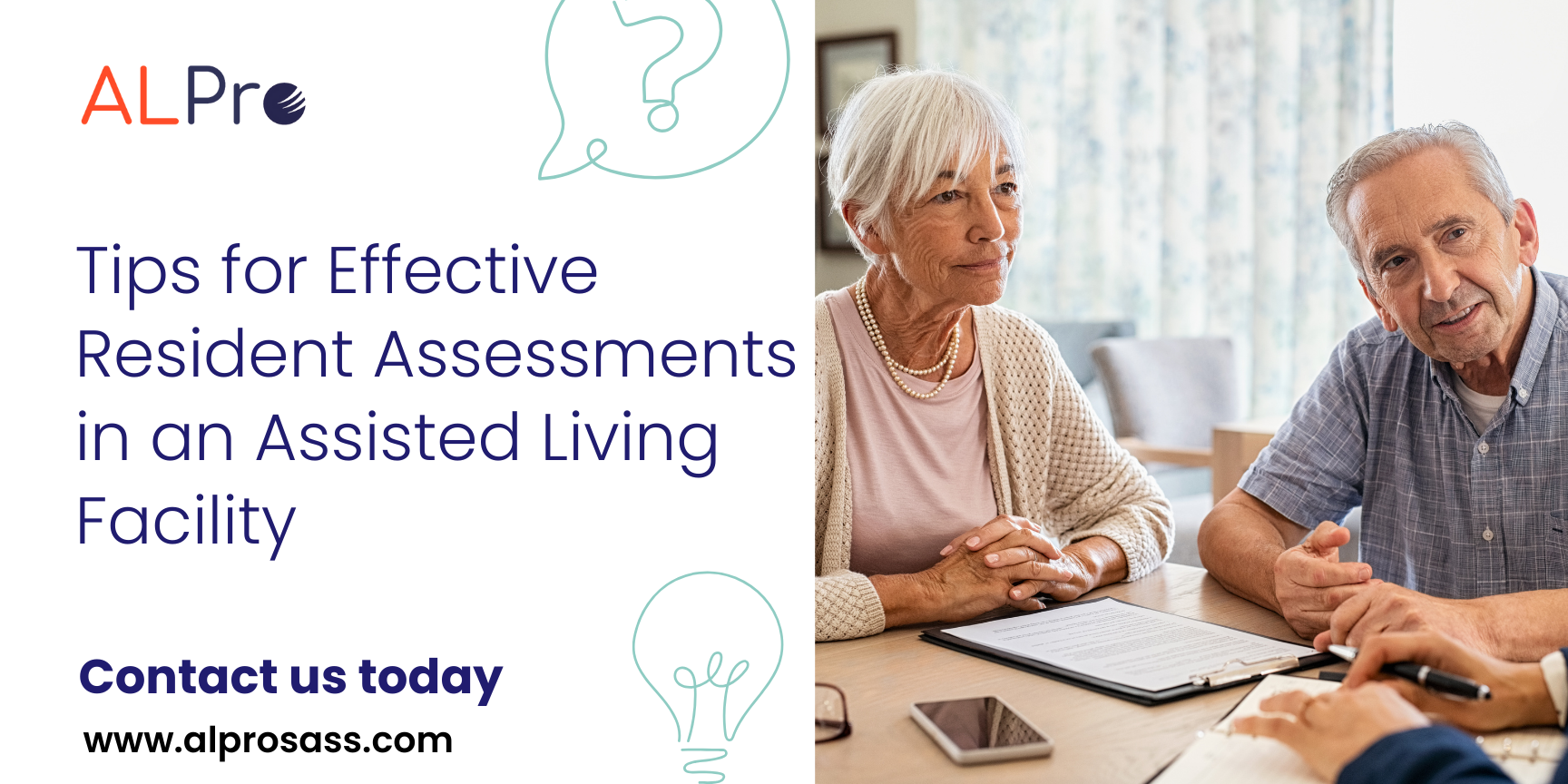Tips for Effective Resident Assessments in an Assisted Living Facility

Resident assessments are the foundation of quality care in assisted living facilities. Through thorough and ongoing assessments, facilities can develop personalized care plans that meet medical needs and enhance each resident's quality of life. Effective assessments ensure that residents are placed at the appropriate level of care and allow staff to monitor changes in physical, emotional, and cognitive health over time. Here are some practical tips for conducting effective resident assessments that will help improve care delivery and support well-being.
1. Establish a Comprehensive Assessment FrameworkA well-structured framework is essential for consistent, thorough resident assessments. This framework should include a mix of physical, mental, and emotional health evaluations, lifestyle preferences, and social needs.
Physical Health: Assess vital signs, mobility, nutrition, and other physical health factors. This helps identify chronic conditions, pain points, and physical capabilities and forms the basis of a resident's care plan.
Cognitive and Emotional Health: Cognitive screenings and mental health evaluations are critical for detecting conditions like dementia or depression. Emotional health assessments provide insight into a resident's mood, stress levels, and overall mental well-being.
Social Needs and Preferences: Knowing each resident's hobbies, interests, and social preferences helps facilities create a more personalized care environment that nurtures emotional health and engagement.
With a clear framework, assessments can be thorough, consistent, and centered on each resident's holistic needs.
2. Involve Family Members and Loved OnesFamily members and close friends can provide valuable information about a resident's health history, lifestyle, and recent changes in behavior. Including family members in the assessment process gives caregivers a complete picture of the resident's needs and preferences, which is particularly important when assessing new residents or those with cognitive decline.
Health and Behavior History: Family members often have insights into the resident's previous health conditions, behavioral tendencies, and preferences, which can significantly enhance the accuracy of the assessment.
Support System: Families can also participate in ongoing assessments by providing regular updates and feedback, especially if the resident's needs evolve over time.
This collaborative approach allows facilities to craft a care plan that aligns with the resident's lifestyle and family expectations.
3. Utilize Technology for Real-Time MonitoringModern technology is making resident assessments more efficient and accurate. From wearable health devices to digital assessment tools, technology enables real-time monitoring, which can detect changes in health status more quickly than traditional assessments.
Wearables and Monitoring Devices: Many assisted living facilities now use wearable devices that track vital signs, sleep patterns, and mobility. These insights allow caregivers to monitor health trends and intervene proactively when necessary.
Digital Assessment Tools: Software solutions and electronic health records streamline the assessment process, ensuring that caregivers can access up-to-date information and minimize the risk of data entry errors.
Technology simplifies assessments and enables ongoing, passive monitoring, reducing the need for repetitive, in-person evaluations and allowing caregivers to focus on hands-on care.
4. Conduct Regular and Consistent AssessmentsResidents' needs change over time, so assessments should be conducted regularly to stay aligned with these changes. Establishing a consistent assessment schedule—such as quarterly or biannual reviews—ensures that care plans are up-to-date and relevant.
Early Detection of Health Changes: Regular assessments help detect subtle shifts in health or behavior that may indicate the onset of new medical issues or the need for adjustments in care.
Adjusting Care Plans: With frequent assessments, staff can make informed changes to care plans, adjusting medication, therapy, and support to accommodate residents' evolving needs.
Consistency in assessments improves the accuracy of care plans and builds a comprehensive health history that can be invaluable in long-term care management.
5. Prioritize Communication and EmpathyResident assessments are not just about collecting data—they allow caregivers to build trust and foster communication. An empathetic, person-centered approach to assessments encourages residents to share concerns, express preferences, and engage in open dialogue.
Active Listening: During assessments, actively listen to residents' thoughts and concerns. This not only helps caregivers better understand the residents' needs but also makes residents feel respected and valued.
Build Rapport: Building rapport with residents during assessments creates a safe space where they feel comfortable discussing personal needs and preferences. This openness enhances the accuracy of assessments and allows caregivers to gain deeper insights.
Empathetic communication ensures that assessments go beyond clinical measurements, allowing caregivers to see the resident as a whole person.
6. Document and Review Assessment Data ThoroughlyAccurate and detailed documentation is critical for effective resident assessments. Care teams need access to clear, up-to-date records to provide consistent care and track health changes over time.
Comprehensive Documentation: Document every aspect of the assessment, including physical, cognitive, emotional, and social needs, along with any observations that may be relevant to future care decisions.
Ongoing Review and Updates: Regularly review and update assessment records to ensure they reflect the resident's current condition and needs. This continuous review process is essential for adjusting care as residents' health and lifestyle preferences change.
With thorough documentation, caregivers can ensure that each resident's care plan is accurate and adaptable.
Putting Effective Resident Assessments into PracticeEffective resident assessments are the cornerstone of quality care in assisted living facilities. By establishing a structured framework, involving family members, utilizing technology, and conducting regular assessments with empathy, facilities can create a truly personalized care experience. Documenting and reviewing assessment data thoroughly ensures that care aligns with residents' evolving needs.
Following these tips, assisted living facilities can foster a supportive and responsive environment where residents feel seen, valued, and cared for. As needs change, these practices enable facilities to adapt, enhancing the quality of life for each resident and building a strong foundation of trust and satisfaction with residents and their families.
